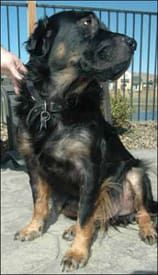Excessive self-licking and chewing can be caused by a medical issue (see “Canine Allergies: Most Common Causes, Best Tests, Effective Treatments,” WDJ, April 2011). It can also be a behavioral problem, a classic example of an obsessive/compulsive disorder. Either way, it’s annoying to the dog’s human companion, and dangerous to the health of the dog. Here are tips for dealing with dogs who self-lick and chew excessively.

1) Bring your dog to his veterinarian for a check up. Nothing you do to address the dog’s behavior will be of much use if your dog itches as a result of environmental allergies or some other medical condition. If you treat the medical condition, the licking and chewing may stop. If not, it’s also become a behavioral issue.
2) Identify your dog’s stressors. The behavioral cause of self-licking and chewing is stress. The stress from a medical condition may persist even after treatment, and the learned licking/chewing behavior may persist even after the medical stress is gone.
Many other stressors can also cause licking and chewing, especially in dogs who are genetically predisposed to compulsive oral behaviors. Large breeds such as the Doberman Pinscher, Great Dane, German Shepherd, Labrador Retriever, Golden Retriever, and Irish Setter are most commonly affected.
To begin behavior modification, determine your dog’s stressors and start eliminating them. Make a list of everything you can think that is stresses your dog – even just a little bit, even if the stressors don’t seem directly related to the licking. Your list might include thunder, small children, dogs on television, cats, riding in cars, visits to the vet, shock collars, medical issues, and many more. Most owners can identify between 10 and 20 stressors for their dogs.
3) Remove stressors from your dog’s life. There are several strategies you can use to remove stressors from your dog’s list:
Get rid of it. Throw away the shock collar – in fact, avoid using aversives as much as possible.
Treat medical conditions. alleviate chronic pain with medication, provide dental care, and address anything else that might be physically troubling your dog.
Change your dog’s opinion. Using counter-conditioning and desensitization, convince your dog that children make chicken fall from the sky. If he decides they are marvelous chicken-providers instead of scary trolls, they’re no longer stressors.
Teach a new behavior. Convince your dog that the rumble of distant thunder is the cue to run to the refrigerator for a bite of cheese. Better yet, make it the cue to run and find his rope toy for arousing game of tug. By changing his behavior (get your toy instead of running to your crate to hide) you also change his opinion (thunder makes tug happen!).
Manage it. If he’s stressed by small children and you don’t have many in your life, just keep them away from him. On the rare occasion when mini-human creatures come to visit, put your dog in a safe, locked room with a tasty stuffed Kong until the creatures are gone.
Live with it. We all live with some stress. Identify the most minimal stressors and just let them be.
4) Increase your dog’s exercise. Aerobic exercise not only burns energy your dog would use to fret (and lick), but also causes the release of feel-good endorphins that help alleviate stress. Mental exercise – shaping, interactive toys – can also help.
5) Utilize stress-reduction products. There are many good products on the market that purport to alleviate stress. Here are some I’ve had success with:
“Through a Dog’s Ear.” Calming classical music selected and clinically tested to reduce a dog’s heart rate, available on CD or MP3.
Thundershirt or Anxiety Wrap. Snugly fitting wearing apparel that holds the dog tightly, similar to swaddling.
Comfort Zone/Dog Appeasing Pheromone (DAP). Synthetic substance that supposedly mimics the pheromones emitted by a mother dog while she’s nursing puppies, with the biological effect of calming the puppies. Comes as a plug-in (like Glade), a spray, and a collar that is impregnated with the substance. Available in most pet supply stores.
Medication. If the licking and chewing is due to significant generalized anxiety, or the behavior has become a compulsive disorder, talk with a veterinary behaviorist or a vet with a special interest in behavior about anti-anxiety medication to improve your dog’s quality of life and decrease the compulsive licking and chewing.
If you don’t have access to a practitioner who is knowledgeable about behavior, your vet can do a phone consult with a veterinary behaviorist. Most offer this service at no charge to other veterinarians. Contact the American College of Veterinary Behaviorists for a referral list.






